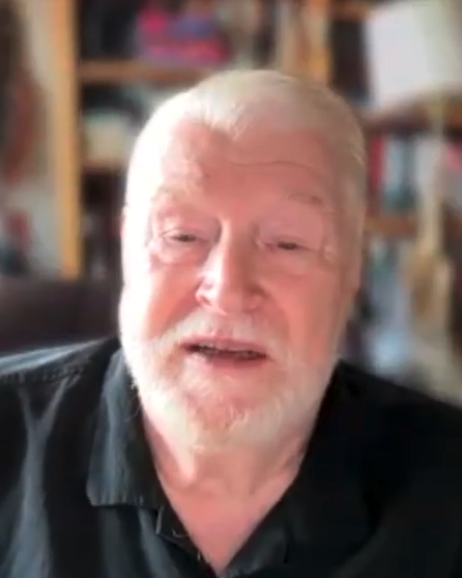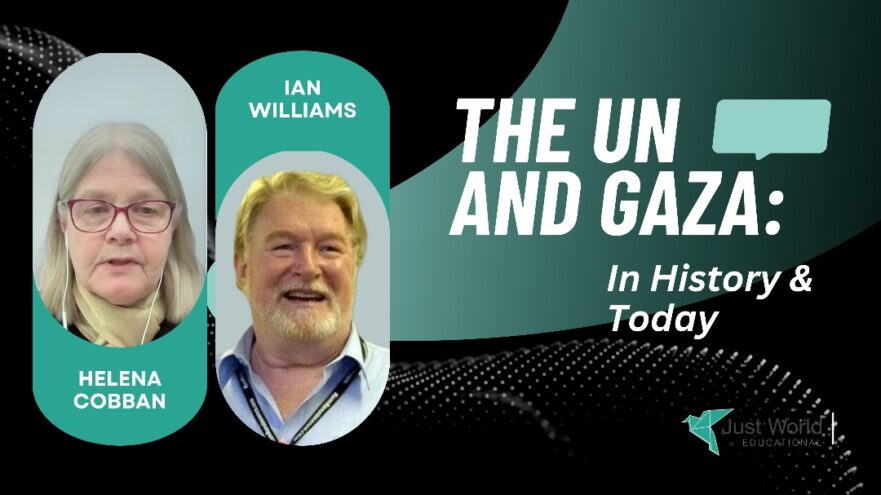On October 2, JWE president Helena Cobban held a fairly informal conversation with the veteran UN correspondent Ian Williams, who in the course of a 35-plus-year career covering the UN has worked for the Guardian and several other outlets. He is currently the correspondent there for the Washington Report on Middle East Affairs. In 2017, he authored a very accessible guide to the UN titled UNtold: The Real Story of the United Nations in Peace and War.
On September 30, UN Secretary-General Antonio Guterres publicly welcomed the announcement US Pres. Trump had made the day before of a 20-point plan that, Guterres said, was “intended to achieve a ceasefire and sustainable peace for Gaza and for the region.” Guterres added that, “It is now crucial that all parties commit to an agreement and its implementation.”
Ms. Cobban, who for many years used to contribute a regular column on global affairs to The Christian Science Monitor, has written quite a lot recently about the role the UN has played in the Palestine Question over the decades, as well as during the current Gaza genocide/crisis. See, for example, these essays she published recently on her Globalities.org platform: A Jewish State in Palestine: The UN’s Original Sin?, and Gaza, and the UN at 80.
She said she was eager to get Mr. Williams’s in-depth and well-informed takes on such topics as: the UN’s current, evident shortcomings regarding the U.S.-Israeli genocide in Gaza; the background to those shortcomings; and what it might be feasible to u rge the UN to do in the weeks and months ahead.

You can see the video of their 30-minute conversation here, and read a transcript of it (PDF) here.
Mr. Williams explained that, “Secretary‑General Guterres is ‘non‑confrontational,’ and his soft‑supportive stance toward Israel and the Trump plan only undermines UN authority.” He added, “I long nostalgically for [former Secretary-General Boutros] Boutros‑Ghali because, unlike today’s leaders, he would not have tolerated the trashing of the UN by Trump and Netanyahu.”
He noted that, “There is an ‘Israeli exception’ that lets violations of international law go unchecked; the UN’s legitimacy is eroding and members must stop being polite and start enforcing the resolutions,” and that “The UN, through resolutions 242 and 338, enshrines the 1967 borders as the legal basis for any peace settlement, yet Israel’s continuous settlement expansion makes a two‑state solution a ‘pipe‑dream’ unless forced by international sanctions or boycotts.”
He and Ms. Cobban pointed out that those “1967 borders” already give Israel a lot more than was allotted to the Jewish State in the UN’s 1947 Partition Plan for Palestine.
Mr. Williams also said it is often in the nature of diplomats to grasp at straws, and described the longstanding proposal for a two-state solution in Palestine/Israel as “the two-state straw.”
Pressed as to whether there actually could be a role for the UN in helping to resolve the Gaza crisis, he pointed to the possible precedent the UN had set by working with the U.S.-led occupation forces in Iraq after the U.S.-led invasion of that country in 2003, which UN leaders at the time had judged to be illegal. “And it wasn’t because they approved of the invasion. It was to try and ameliorate the effects for the people.”
Thus, he said, “You could almost conceive of a role in Gaza with the UN bringing UNRWA back and the other agencies. But they would have to be much firmer and say, No, we’re not going to do it on your terms. You either let us in there with neutral peacekeepers whom we will pick protecting us or we won’t go. And they have to present it in stark terms instead of doing the traditional UN thing of slicing and dicing and synoptically pulling closer to the Israeli position…”
Clearly, this issue of the relationship between the Gaza genocide/crisis and the activities and status of the UN is one that will continue to have great relevance.

